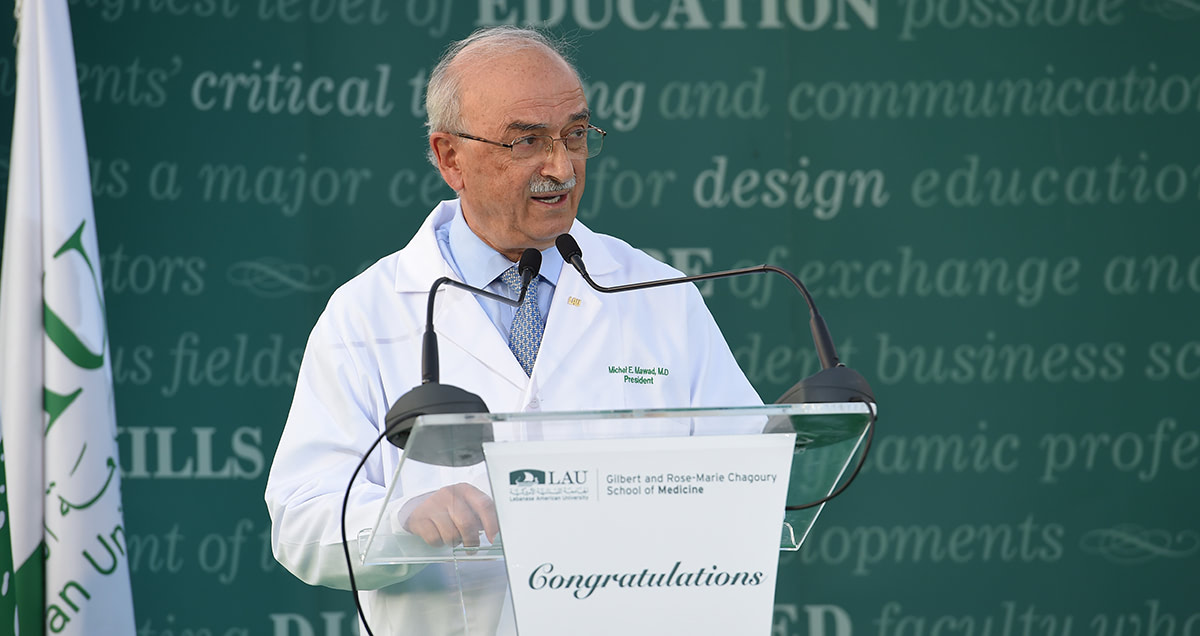Dr. Mawad’s Legacy: Weathering Storms, Emerging Stronger
The president will continue serving LAU as a physician, having achieved visionary milestones that ensured the university’s survival and growth.
Closing his tenure this month as LAU’s ninth president, Dr. Michel E. Mawad reflected on it as “a period of passion, immense learning and discovery,” as he, together with the university community and the country at large, withstood a series of existential crises and a global epidemic.
The scope and gravity of the events, unprecedented in the history of Lebanon, were to shape Dr. Mawad’s mission to future-proof the university against similar threats. This led to landmark accomplishments that have fortified LAU’s standing in academia, healthcare, research, industry partnerships and geographical expansions.
Taking the reins in September 2020, a few weeks after the August 4 explosion, Dr. Mawad was faced with the urgent need to address challenges such as faculty and staff attrition, student retention and operational continuity.
Dr. Mawad rallied the provost, deans, faculty and other university constituents to switch to online course development and delivery, which successfully resulted in the seamless launch of the 2020–2021 academic year despite prevailing uncertainties.
In parallel, he presided over massive fundraising efforts to acquire PCR tests and vaccines, secured and delivered to LAU constituents, allowing LAU to reopen its gates by the end of August, the first university in Lebanon to do so.
In the short years that followed, LAU launched multiple graduate degrees—both online and in person—and transformed the New York office into a registered degree-granting branch campus, becoming the first university in the Arab world to reach this milestone.
Other academic feats included the university’s placement on several world-renowned ranking lists, such as making the top nationwide spot on Times Higher Education and a debut on the Shanghai Academic Rankings of World Universities.
Attesting to its educational excellence, generous financial aid program, and leadership in extending emergency relief to faculty and staff, LAU’s enrollment numbers shot up during Dr. Mawad’s presidency, surpassing 9,000 students this year.
Not surprisingly, these steps later on translated into more sustainable initiatives: The rollout of the Healthcare Provider Management Program and the faculty and staff Leadership Program; the expansion of the university’s Equitable Pension Plan; and the Gender Equity Plan, a first for an academic institution in Lebanon.
Committed to transforming LAU into a comprehensive research hub and an active participant in the country’s recovery and sustainability, Dr. Mawad launched several centers and facilities to promote collaboration with industry and impactful research into policymaking and healthcare.
Among these were the LAU Industrial Hub, a one-of-a-kind physical and cyber hub for industry-academia collaboration; the Center for Policy Analysis, a think-tank of LAU, regional and international experts; an Office for Sustainability, the first-of-its-kind at a Lebanese institution of higher learning, designed to instill a culture of sustainability through the curriculum, research and renewable resources, thereby reinforcing the university’s role as an incubator for leaders; and the Office of Professionalism and Ethics to ensure adherence to the highest ethical and moral standards at the university.
Previously, during his deanship of the Gilbert and Rose-Marie Chagoury School of Medicine, Dr. Mawad had established another national first: The Comprehensive Stroke Center in 2018, which has since provided life-saving treatment for stroke victims through dedicated multidisciplinary teams. Also as then dean, he was the driving force behind the acquisition of the management of the new LAU Medical Center–Saint John’s Hospital in Jounieh. Adding this facility made Dr. Mawad’s vision of making a comprehensive healthcare system a reality.
A more recent addition to the roster of innovative healthcare firsts is the Pharmaceutical and Medical Research Center, dedicated to testing and developing generic medication to provide the community with affordable alternatives to brand-name drugs. The center will also offer invaluable experiential education for faculty and students, nurture research collaborations with other academic institutions, and increase knowledge creation overall.
Dr. Mawad launched the Presidential Intramural Research Fund (PIRF), which, in its first year alone, offered 40 grants. This initiative not only doubled in budget in the following year but also created a multiplier effect as the faculty on the receiving end must apply for extramural grants, thus paving the way for a sustainable culture of research.
In a recent address to the annual faculty assembly on September 14, 2024, Dr. Mawad expressed his firm conviction that “LAU will continue to accumulate strength and gain momentum under the guidance of the Board of Trustees and the incoming president, Dr. Chaouki Abdallah.”
He also announced that he will continue to serve LAU in a role that is dearest to his heart: A teaching physician.
“Being at the helm of LAU for the past four years, and before that as a dean, has been a singular honor and will always be one that I cherish,” he said, adding that institutions are based on the principle of continuity and “as we celebrate our centennial this year, it is all too evident that LAU has mastered the art of transitioning into bigger and better things while continuing to cherish its precious legacy.”
Extending a warm welcome to Dr. Abdallah, he wished him all the success and assured him of his cooperation “as he will lead LAU to yet greener pastures.”
